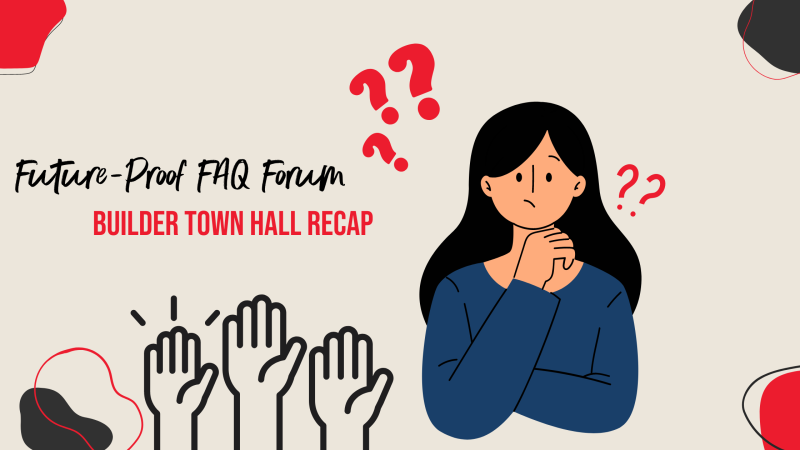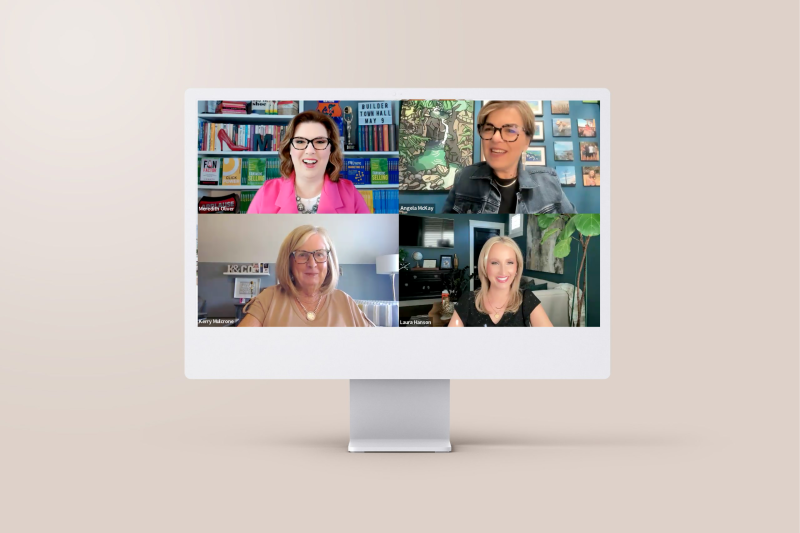Future-Proof FAQ Forum: June 2024 BTH Recap

The only thing constant is change, but somehow we as humans are so brutally resistant to it. From changing our hairstyle to changing what brand of hand soap we use, small changes in our lives can cause big feelings of fear and frustration. Rather than dig in our heels, it’s time to embrace the inevitable.
As we continue to experience change through the current trend of micro-markets (markets that shift rapidly, rather than shifting on a monthly or quarterly basis), it’s imperative that we implement strategies, tools, and techniques that will help us persevere.
Fortunately for you, we sat down with an incredible panel of sales and marketing geniuses at our most recent Builder Town Hall to get the inside scoop on how they keep their footing in an ever-shifting market. Our guests included VP of Sales at Eastwood Homes and author of Just Brave It!, Amy Druhot, Broker/Realtor at The Jim Allen Group, Laurie Evans, and Director of Industry and Sales at Zillow, Qadra Evans. And boy did they deliver!
We answered your most burning questions and dug into the nitty gritty of what makes these fantastic human beings so fantastic! Read on to learn how to future-proof your business.
Q: How do you future-proof your team in today’s market?
Amy Druhot: Future-proofing your team is something that I don’t think we put enough thought into. As leaders in our industry, we take advantage of the fact that we as individuals often don’t leave companies or cultures that are no longer a good fit for us because we overvalue stability…But, ultimately, if your culture is not good, your team will not stay. You’re going to lose them at some point in time — whether you lose them physically as they walk out the door, or you lose them while they sit in a seat in your models or in your office, selling and representing your brand — either way, it’s not good.
…At the end of the day, it’s the culture. It’s not one size fits all. I think that when you think about your team — especially with the ups and downs that we see in our industry — it is so important that your team can rely on you, and that they know that when things are like this, you’re going to be a source of support. They know what to expect from you. They know that you’re going to have their back, that you’re in their corner.
Q: How often do you provide training for your team?
Amy Druhot: I believe with training, consistency is key. In the same sense that training holds our teams accountable, you as a leader have to hold yourself accountable to sticking to that consistency.
Training has multiple different layers. There is the large-scale training, where you have your onboarding, the training for your teams within their sales environment, and the one-on-one coaching. It’s not a one-size-fits-all when it comes to your team’s needs, but for me, one-on-one coaching is the most important.
I like to remove my team from their model, take them someplace else, and sit down with them for coaching. I think that it takes them out of their normal environment and creates a fresh environment to actually have conversations and get to know them…Training is important, and consistency is key, but you have to do the work to understand the person you’re coaching before you ever start to lead them toward developing themselves.
Q: How do you make your listings stand out?
Laurie Evans: I like to kind of look at things from two different angles because I think we’re targeting two different groups: We’re targeting agents when they’re doing their MLS searches to show buyers, and then we’re targeting buyers online to get them into our homes. How we do things is directed according to who we’re marketing toward.
…All agents want to be the hero of their clients, right? The more information we can give them, the more comfortable they will feel selling your product. This means keeping pictures updated and making sure that our listings are mapped correctly.
Qadra Evans: On Zillow, it all starts with the MLS. We’re only as good as the data that we’re getting. So if you’re not using those remarks or putting in lots of great high-resolution photos and you just have pictures of dirt or half-constructed homes, that’s what we’re showing. You’re competing against resale. You’re competing for those same eyeballs of those hundreds of millions of viewers on Zillow every day.
I also can’t even stress enough the importance of having 3D tours, virtual stagings, and interactive floor plans on your listings…In the past, we didn’t have a way to make buyers feel comfortable with something that might not be built yet. But now we have a way. So use it.
Q: At what point in the building process should we replace renderings with actual photos?
Laurie Evans: We have to know our product, know what we’re selling, and think about what is going to make each specific house sell. Is it the amazing island in the kitchen? Is it the community?… Everything we’re doing is super specific to the house we’re selling.
So the answer to this question is, I think it depends. I think that it’s very important to show the stage of the home. I don’t think it’s such a big deal to put things in so early anymore…I think it’s more important that you’re looking at it as a community and saying, “Okay, what’s going to bring the buyers in the door?” Then, once you have them there, you can find out exactly what they’re looking for, and sell them on the emotion or the community.
We don’t want to just stick everything in the MLS, because what we’re really fighting against right now is a lack of urgency. This is because we came from a market where nobody was doing pre-sales, and nobody was listing their homes until the homes were 100% finished. Today we are in a market where everybody is listing dummy specs that haven’t even started construction and everybody is doing pre-sales. All of those dummy specs that we’re sticking in the computer make people think that there’s an abundance of inventory, so now they don’t have to make a decision. They know that if they miss an opportunity, the builder has 15 other available homes and they’ll likely reduce the prices in a couple of weeks. There’s no sense of urgency whatsoever.
Q: How do you combat this lack of urgency?
Qadra Evans: We get tons of feedback from builders that say 3D homes are too expensive, time-consuming, and out of the normal day-to-day. But then I think of how much money builders are spending on sales teams and models and marketing content and websites and buying leads, and I’m like, why wouldn’t you invest and put your best foot forward? You are competing with resale listings that have all this stuff, and so you have to find a way to win those eyeballs. A lot of people think resale is the only way to go. So if you can start winning eyeballs by making everything really grand and attracting that attention, that’s how you take the win.
Amy Druhot: Builders often don’t want to spend the money. But if you take a look at your carrying costs for a home and compare it to the cost of a tool that will sell your home 2-4 months sooner, it’s well worth the investment.
You have to think about your ROI as it relates to the tools that are available to us today. And the reality is, too, you don’t want to be the only builder in your market not utilizing those tools… It’s really important that you’re looking at what your competitors are doing. You need to be in Zillow, you need to be in MLS. You need to look at their listings and see what they are doing that draws buyers to them so that you can do the same things and remain competitive. And in the long run, it will save you money, because you will sell houses faster.
Q: Do you have open discussions with your sales and marketing teams about embracing technology that could eliminate or change their positions?
Amy Druhot: At the end of the day, I do not sell homes. I am in the people business, that is what we do. The day that we all move completely away from the personal connections and that relationship-based buyer experience that we provide will be a really sad day.
At my company, we really care about the buyer experience and the one-on-one relationship that’s built from day one until past closing. I hope that we’re able to provide an even deeper, richer experience, where we offer tools upfront that help make it easier for buyers to find the home that works for them… We don’t want to remove that human aspect of empathy and the excitement that we get to share when we help someone find their dream home. You cannot replace it with any sort of technology. I don’t think sales individuals should feel threatened by technology replacing them. I think that they should embrace it as a tool that they can use to enhance the experience.
Qadra Evans: We call it being a tech-enabled salesperson. No consumer has told us, that they want a completely automated transaction. They want to be given all these tools so that they can do things on their own. And when they’re ready to move forward, they want a human being to help them through the rest of the process. That relationship piece is irreplaceable, and it always will be. Today, the sales process is more of a hybrid experience. We give the buyers the tools and they will raise their hand when they’re ready for somebody to come in and help them.
Q: What incentives or promotions are you seeing that are working?
Qadra Evans: A lot of times, buyers just don’t understand what buying down an interest rate means. Explaining how beneficial that can be in affecting their monthly bottom line is something that I think we all just have to get better at. When you’re talking to them in mortgage speak or builder speak, they don’t actually understand the scale of the benefit.
Amy Druhot: None of that matters if it’s not the right home. If I was getting married, and I went dress shopping and saw the perfect dress within my budget, but then you offered me a free dress, I’m not going to take the free dress! I want the dress that I want.
…None of this will matter a year from now when they’re sitting in their living room having coffee looking around and thinking “Oh my gosh, I can’t believe that this is where I live.” We have to get past the incentives and past the gimmicks and really get focused on what the buyer actually needs.
Can’t get enough of all this incredible industry insight? Join us at our next Builder Town Hall on August 2 at 12pm EDT! Register now to secure your spot. In the meantime, be sure to join our Builder Town Hall Facebook Group and keep the conversation going!
Categorised in: Builder Town Hall, Content Marketing, Customer Experience, Digital Marketing, FANtastic Marketing Tips, Technology



